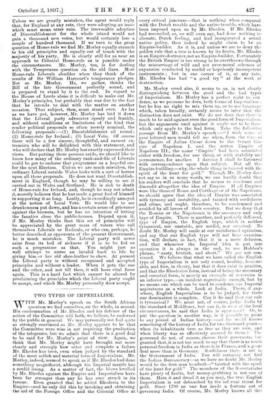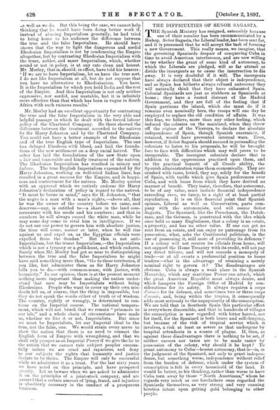TWO TYPES OF IMPERIALISM.
WITH Mr. Morley's speech on the South African question we find ourselves, on the whole, in accord. His condemnation of Mr. Rhodes and his defence of the action of the Committee will both, we believe, be endorsed by the public in general. We may personally not feel quite as strongly convinced as Mr. Morley appears to be that the Committee were wise in not requiring the production of the telegrams, but we admit that there is a good deal to be said for Mr. Morley's point of view. Again, we think that Mr. Morley might have brought out more clearly and strongly how utter and complete a failure Mr. Rhodes has been, even when judged by the standard of the most selfish and material form of Imperialism. Mr. Morley, indeed, seemed to speak as if Mr. Rhodes had done something magnificent, although his Imperial mantle has a sordid lining. As a matter of fact, the blows levelled by Mr. Rhodes against the Empire and Imperialism have been far stronger than any he has ever struck in its favour. Even granted that he added Rhodesia to the Empire—and he only did this by invoking and obtaining the aid of the Foreign Office and the Colonial Office at every critical juncture—that is nothing when compared with the Dutch trouble and the native trouble, which have been imposed upon us by Mr. Rhodes. If Mr. Rhodes had reconciled, or, we will even say, had done nothing to alienate, Dutch feeling, and had inaugurated a sound native policy, then indeed he might claim to be an Empire-builder. As it is, and unless we are to deny the golden rule that a tree is known by its fruits, Mr. Rhodes is an Empire-destroyer, not an Empire-builder. Fortunately the British Empire is too strong to be overthrown through the miscarriage of wild and not over-moral schemes of expansion conducted by sordid or hopelessly incompetent instruments ; but in one corner of it, at any rate. Mr. Rhodes has had " a good try " at the work of destruction.
Mr. Morley erred also, it seems to us, in not clearly distinguishing between the good and the bad types of Imperialism. Mr. Morley has a perfect. right to con demn, as we presume he does, both forms of Imperialism : but he has no right to mix them up, or to use language which, taken broadly, certainly seems to infer that the distinction does not exist. We do not deny that, there is much to be said against even the good form of Imperialism. but the arguments used against it ought not to be thos.. which only apply to the bad form. Take the following passage from Mr. Morley's speech :—" I wish some of your lettered men would tell me when, from the time of the Empire of Julius Caesar down to the tvrant Em- pire of Napoleon I. and the rotten Empire of Napoleon III., the name ' Empire' had been associated either with freedom, for one thing, or with stability and permanence, for another. I daresay I shall be favoured with correspondence upon that subject. But all this Empire-building—why, the whole thing is tainted with the spirit of the hunt for gold." Though Mr. Morley does not say so in so many words, we can hardly doubt that his readers will conclude that he means to condemn and discredit altogether the idea of Empire. If all Empires were like those of Rome and Carthage or of the Napoleons, we should agree that the idea of Empire was associated with tyranny and instability, and tainted with sordidness and crime, and ought, therefore, to be condemned and avoided by all lovers of their country. But we deny that the Roman or the Napoleonic is the'necessary and only type of Empire. There is another, and perfectly different, type of Empire, the English type, which is neither tyrannical, nor unstable, nor sordid, nor criminal. No doubt Mr. Morley will smile at our uninformed optimism, and say that our English type will not bear examina- tion, will declare, in fact, that it is a mere delusion, and that whenever the Imperial idea is put into operation it is always in the end, to use Hobbes's phrase, " nasty, brutish, and short." We are not con- vinced. We believe that what we have called the English type of Imperialism is not only sound, healthy, honour- able, and free, in theory, but that it does exist in practice, and that the Rhodesian form, instead of being the necessary and essential form, is merely an example of reversion to an inferior type,—an incident regrettable enough, but by no means one which can be used to condemn our Imperial aspirations as a whole. Look at India. There, if any- where, English Imperialism is to be judged, for there our domination is complete. Can it be said that our rule is tyrannical? We must not, of course, judge India by the standard of Middlesex, but can it, in view of the local circumstances, be said that India is oppressed ? Or, to put the question in another way, is it possible to point to any period of Indian history—and the world knows something of the history of India for two thousand years— when its inhabitants were so free as they are now, and when liberty was so effectively secured to them i' The governed do not, of course, choose their governors; but granted that, it is not too much to say that there is as much personal freedom in India as there is in France, and a great deal more than in Germany. Sordidness there is not in the Government of India. You will certainly not find the Indian Bureaucracy—as we have no doubt Mr. Morley would be the first man to admit—" tainted with the spirit of the hunt for gold." The members of the SecretariateF have plenty of faults, but money-grubbing is not one of them. Hate it and dread it as you may, the true English Imperialism is not debauched by the infernal thirst for gold. Since 1790 no one has made a fortune out of governing India. Of course, Mr. Morley knows all this as well as we do. But this being the case, we cannot help thinking that he would have been doing better work if, instead of abusing Imperialism generally, he had tried to bring home to his audience the difference between the true and the false Imperialism. He should have shown that the way to fight the dangerous and sordid Rhodesian Imperialism is not by condemning the Empire altogether, but by contrasting Rhodesian Imperialism with the truer, nobler, and saner Imperialism, which, whether sound or not in policy, is at any rate clean and honest. Mr. Morley, that is, should, in effect, have told his hearers : ' If we are to have Imperialism, let us have the true sort. I do not like Imperialism at all, but do not suppose that you have no alternative to Rhodesianism. You have. It is the Imperialism by which you hold India and the rest of the Empire. And this Imperialism is not only neither oppressive, nor sordid, nor unstable, but it is infinitely more effective than that which has been in vogue in South Africa with such ruinous results.'
Mr. Morley had an excellent opportunity for contrasting the true and the false Imperialism in the very able and helpful passage in which he dealt with the forced labour policy of the Chartered Company. He there showed the difference between the treatment accorded to the natives by Sir Harry Johnston and by the Chartered Company. You could not have a better example of the Rhodesian and of the true English type of Imperialism. The one has deluged Rhodesia with blood, and laid the founda- tions of the new settlement on a deep racial hatred. The other has laid the foundations of the new State upon a fair and reasonable and kindly treatment of the natives. The Rhodesian Imperialism has resulted in misery and failure. The true English Imperialism expounded by Sir Harry Johnston, working on well-tried Indian lines, has resulted in a great success for the Empire, and in happi- ness and contentment for the natives. Mr. Morley quotes with an approval which we entirely endorse Sir Harry Johnston's declaration of policy in regard to the natives. "It must be borne in mind," says Sir H. Johnston, "that the negro is a man with a man's rights,—above all, that he was the owner of the country before we came, and deserves—nay, is entitled to—a share in the land com- mensurate with his needs and his numbers ; and that in numbers he will always exceed the white man, while he may some day come to rival him in intelligence. If we do not use our power to govern him with absolute justice, the time will come, sooner or later, when he will rise against us and expel us, as the Egyptian officials were expelled from the Soudan." But this is not anti- Imperialism, but the truest Imperialism,—the Imperialism which is not a tyranny or a gold-hunt, and which endures. Surely when Mr. Morley had got so near to distinguishing between the true and the false Imperialism he might have said something more than, "Go to these territories, if you like, but administer them as Sir Harry Johnston tells you to do,—with common-sense, with justice, with humanity." In our opinion, there is at the present moment nothing more important than making the nation under- stand that men may be Imperialists without being Rhodesians. People who want to cover up their own mis- deeds tell us, of course, that the thing is impossible, but they do not speak the words either of truth or of wisdom. The country, rightly or wrongly, is determined to con- tinue on the Imperial course. The national tempera- ment, which will not brook that we remain " prisoners to our isle," and a whole chain of circumstance have made us, whether we like it or not, Imperialists. But since we must be Imperialists, let our Imperial ideal be the true, not the false, one. We would strain every nerve to show the nation that there is no need to connect the English form of Empire with wrongdoing, and that we shall only prosper as an Imperial Power if we give the lie to the notion that we cannot rule subject peoples success- fully unless we are cruel and rapacious, and deny to our subjects the rights that humanity and justice declare to be theirs. The Empire will only be successful while we administer it as a trust. For the last sixty years we have acted on this principle, and have prospered greatly. Let us beware when we are asked to administer it on the principles of a joint-stock company, and are assured that a certain amount of lying, fraud, and injustice is absolutely necessary in the conduct of a prosperous business.







































 Previous page
Previous page